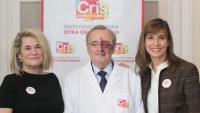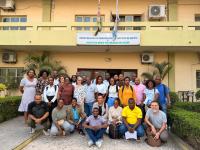Members of RETS assess the work done and make commitments to strengthen future actions
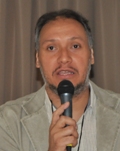 “This is the time when we gather to plan and set the routing to the International Education Network for Health Technicians (RETS), and Networks of Technical Schools of CPLP and Unasur in the coming years, so that they can contribute effectively to the improvement of national health systems. It is time to take commitment to do it the best way and in the specificity of each member country”. It was with these words that the director of Joaquim Venâncio Polytechnic School of Health (EPSJV/Fiocruz), Paulo César de Castro Ribeiro opened the 3rd General Meeting of RETS, held on November 7th and 8th in Recife (Pernambuco-Brazil) along with the 2nd Meeting of RETS-CPLP and RETS-UNASUR.
“This is the time when we gather to plan and set the routing to the International Education Network for Health Technicians (RETS), and Networks of Technical Schools of CPLP and Unasur in the coming years, so that they can contribute effectively to the improvement of national health systems. It is time to take commitment to do it the best way and in the specificity of each member country”. It was with these words that the director of Joaquim Venâncio Polytechnic School of Health (EPSJV/Fiocruz), Paulo César de Castro Ribeiro opened the 3rd General Meeting of RETS, held on November 7th and 8th in Recife (Pernambuco-Brazil) along with the 2nd Meeting of RETS-CPLP and RETS-UNASUR.
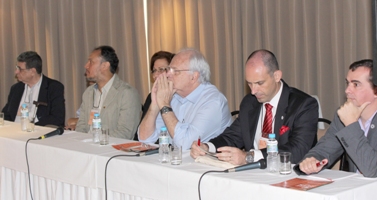 After the message of the direction of EPSJV/Fiocruz, it was the turn of the other members of the opening panel to transmit their messages of welcome to the participants of the meeting. In few words and very warmly the coordinator of International Cooperation of the Community of Portuguese-speaking Countries (CPLP), Manuel Clarote Lapão; the alternate coordinator of Argentina in the Union of South American Nations (Unasur) , Sebastián Tobar; the Regional Advisor of Nursing and Health Technicians from PAHO/WHO, Silvia Cassiani; the technical coordinator of the South American Institute of Government in Health (Isags), Henry Jouval; the general coordinator of Technical Actions in Education in Health in the Ministry of Health of Brazil, Aldiney Doreto; and the coordinator of the Center for International Relations in Health at Oswaldo Cruz Foundation (Cris/Fiocruz ), Paulo Buss , highlighted, among other things, the technical and political importance of the meeting, the need to strengthen the initiative and the role of the people present in subsequent discussions , bringing a unique vision of the problems of each institution and country and a plural look at the issues that affect health technicians and the Network.
After the message of the direction of EPSJV/Fiocruz, it was the turn of the other members of the opening panel to transmit their messages of welcome to the participants of the meeting. In few words and very warmly the coordinator of International Cooperation of the Community of Portuguese-speaking Countries (CPLP), Manuel Clarote Lapão; the alternate coordinator of Argentina in the Union of South American Nations (Unasur) , Sebastián Tobar; the Regional Advisor of Nursing and Health Technicians from PAHO/WHO, Silvia Cassiani; the technical coordinator of the South American Institute of Government in Health (Isags), Henry Jouval; the general coordinator of Technical Actions in Education in Health in the Ministry of Health of Brazil, Aldiney Doreto; and the coordinator of the Center for International Relations in Health at Oswaldo Cruz Foundation (Cris/Fiocruz ), Paulo Buss , highlighted, among other things, the technical and political importance of the meeting, the need to strengthen the initiative and the role of the people present in subsequent discussions , bringing a unique vision of the problems of each institution and country and a plural look at the issues that affect health technicians and the Network.
The event, which theme was ‘The Network as a place of production of knowledge about education and work of health technicians’, happened as a preliminary activity to the 3rd Global Forum on Human Resources for Health, and brought together about 80 representatives of countries and institutions that are part of the networks.
The official agenda of the meeting was the discussion and approval of the work and the regulation plan of the three networks and the election of the future headquarters of the Executive Secretariat of RETS and RETS-Unasur, in addition to the joint development of the ‘Document of Recife on Education and Work of Health Technicians’, to be disclosed among the participants of the Global Forum. In the affective agenda, closer ties among members and strengthening linkages that make possible the work of RETS and its sub-networks.
Opening lecture discusses the work of health technicians in global context
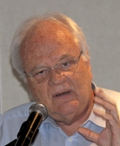 The first activity scheduled for the Meeting aimed to contextualize the discussions to be held during the event in a broader setting. The task fell to former President of Fiocruz Paulo Buss, one of the great supporters of RETS and one of the responsible people for the creation of RETS-Unasur and RETS-CPLP, with the lecture ‘Health in the Post-2015 Global Development Agenda: the role of technical health worker and structural networks’ (Saúde na Agenda Global do Desenvolvimento Pós-2015: o papel do trabalhador técnico em saúde e das redes estruturantes).
The first activity scheduled for the Meeting aimed to contextualize the discussions to be held during the event in a broader setting. The task fell to former President of Fiocruz Paulo Buss, one of the great supporters of RETS and one of the responsible people for the creation of RETS-Unasur and RETS-CPLP, with the lecture ‘Health in the Post-2015 Global Development Agenda: the role of technical health worker and structural networks’ (Saúde na Agenda Global do Desenvolvimento Pós-2015: o papel do trabalhador técnico em saúde e das redes estruturantes).
In his presentation, followed by discussion, Buss showed how the current social, political and economic situation interferes with the global development agenda, highlighted the issue of social determinants of health; compared the health-related aspects in the context of the Millennium Development Goals (MDGs) and the Objectives of Sustainable Development (ODS), which fall into the post-2015 Agenda, and set out a number of key global, national and local challenges, including aspects of education and work in health.
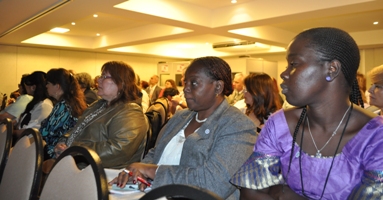 About the global situation, he mentioned some of the main consequences and changes resulting from the economic crisis installed in 2008, which started in the U.S., and that was reflected in almost all countries, according to him, on account of a “dictatorship of consumerism, headed by mainstream media”, there was an amplification of poverty and unemployment, in addition to a food, energy and ethics crisis. “We observed amplification of poverty and unemployment among young people in the world, in addition to the precarious informal work, worst among the lower income. Only in Latin America and the Caribbean, are 127 million and 47% of urban workers in this situation”, the speaker said, expressing concern with the fact that there are in the world, according to 2011 data from the United Nations, around 925 million people with chronic hunger, 885 million without access to drinking water and 2.6 billion without access to sanitation. “In this scenario there is a triple burden of diseases and globalization of unhealthy ways of life, often constrained by commercial interests”. Buss called attention to the fact that life expectancy in Sub-Saharan Africa is only 53 years old, or 27 years less than in high-income countries. “It is unacceptable that creatures of the same species have an expectation of life so different, only for reasons of equity investments,” he lamented.
About the global situation, he mentioned some of the main consequences and changes resulting from the economic crisis installed in 2008, which started in the U.S., and that was reflected in almost all countries, according to him, on account of a “dictatorship of consumerism, headed by mainstream media”, there was an amplification of poverty and unemployment, in addition to a food, energy and ethics crisis. “We observed amplification of poverty and unemployment among young people in the world, in addition to the precarious informal work, worst among the lower income. Only in Latin America and the Caribbean, are 127 million and 47% of urban workers in this situation”, the speaker said, expressing concern with the fact that there are in the world, according to 2011 data from the United Nations, around 925 million people with chronic hunger, 885 million without access to drinking water and 2.6 billion without access to sanitation. “In this scenario there is a triple burden of diseases and globalization of unhealthy ways of life, often constrained by commercial interests”. Buss called attention to the fact that life expectancy in Sub-Saharan Africa is only 53 years old, or 27 years less than in high-income countries. “It is unacceptable that creatures of the same species have an expectation of life so different, only for reasons of equity investments,” he lamented.
Reaffirming the social determinants of health, which results not only biological issues, but issues relating to income, education, employment, child development, culture, gender and environmental conditions, among others, he ensured that no significant reduction of economic and social inequalities, will be impossible to reduce health inequalities and improve health. "Health and healthy healthcare systems require changes in economic, social and environmental global policies," he argued.
About the role of technical health schools (ETS) on the global stage, he was conclusive. “They should generate evidence and translate them into policies; protect health and science for the transformation of social and health policies for social and health equity in national and global levels; educate human resources capable of intervening technical and political processes; defend universal health, equitable, comprehensive and quality systems; make political and technical monitoring; perform work of national, regional and global policies to expand the technical capabilities and networks”, enumerated, also emphasizing the importance of national, regional and global networks for the potentiation of results.
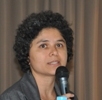 To finish programming of the morning of November 7th, it was made a brief summary of the work undertaken by the Secretariat of the Network in recent years. The journalist Elisandra Galvão presented the new website of RETS, which symbolic launch took place during the event and will be online in mid-January. “The new site, built from assessments made by participants of the 2nd General Meeting of RETS in 2009, provides a more intuitive interface, which promotes localization of news and documents desired and the interaction among users.”, she explained. She also emphasized the increasing use RETS been doing of social networks to disseminate topics of interest and relevant information about the education and work of health technicians.
To finish programming of the morning of November 7th, it was made a brief summary of the work undertaken by the Secretariat of the Network in recent years. The journalist Elisandra Galvão presented the new website of RETS, which symbolic launch took place during the event and will be online in mid-January. “The new site, built from assessments made by participants of the 2nd General Meeting of RETS in 2009, provides a more intuitive interface, which promotes localization of news and documents desired and the interaction among users.”, she explained. She also emphasized the increasing use RETS been doing of social networks to disseminate topics of interest and relevant information about the education and work of health technicians.
How to strengthen Networks?
Coordinated by Ana Beatriz de Noronha (EPSJV/Fiocruz), the roundtable ‘Networking: the challenge of institutionalization and definition of commitments’ gathered Silvia Cassiani (PAHO-WDC), Manuel Lapão (CPLP) and Isabel Duré (Ministry of Health-Argentina) to discuss strategies to enable the continuity of the work of the three networks: RETS, a knowledge network, established in 1996 and reactivated in 2005 at the initiative of PAHO/WHO, and its two sub-networks – RETS-CPLP and RETS-Unasur – created in 2009 as networks of structural health institutions.
How to prevent the emptying of RETS and expand the production and dissemination of knowledge that can contribute to strengthening education of health technicians in the country? How PAHO/ WHO may, resuming its original role, effectively contribute to that? How to make both RETS-CPLP and RETS-Unasur, which creation was proposed and approved by the authorities responsible for their blocks, able to overcome the problems of institutionalization in the countries in order to fulfill their mission to contribute to the creation of health systems suited to the needs of different populations? These were some of the questions that guided the speeches of the members of the table.
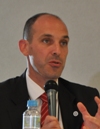 Director of Cooperation of the CPLP, Manuel Lapão made ??a brief presentation of the Indicative Cooperation Plan (CIP) 2013-2016 (Plano Indicativo de Cooperação (PIC) 2013-2016), which aims to more than six million euros for various projects and confirms, in practice, cooperation in various fields as statutory objectives of the CPLP. Lapão highlighted the work of RETS under the Strategic Plan for Cooperation in Health (Pecs) and showed a video about buying multimedia equipment - TVs, laptops, projectors and screens - to 33 institutions for educating health technicians of Palop that comprise the Network. He highlighted the important role that civil society has to influence public policies of States. He recalled that the geographical discontinuity faced by CPLP countries located in four distinct geographic regions, represents a challenge for the community and also to the Network. “I believe that the improvement of communication is crucial for the establishment of dialogue and strengthening of the initiative," he said.
Director of Cooperation of the CPLP, Manuel Lapão made ??a brief presentation of the Indicative Cooperation Plan (CIP) 2013-2016 (Plano Indicativo de Cooperação (PIC) 2013-2016), which aims to more than six million euros for various projects and confirms, in practice, cooperation in various fields as statutory objectives of the CPLP. Lapão highlighted the work of RETS under the Strategic Plan for Cooperation in Health (Pecs) and showed a video about buying multimedia equipment - TVs, laptops, projectors and screens - to 33 institutions for educating health technicians of Palop that comprise the Network. He highlighted the important role that civil society has to influence public policies of States. He recalled that the geographical discontinuity faced by CPLP countries located in four distinct geographic regions, represents a challenge for the community and also to the Network. “I believe that the improvement of communication is crucial for the establishment of dialogue and strengthening of the initiative," he said.
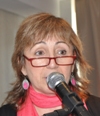 In her lecture, the National Director of Human Capital and Occupational Health, Ministry of Health of Argentina, Isabel Duré sought to reflect on RETS and RETS-Unasur, based on some important networking concepts developed by the Argentine Mario Rovere. In this sense, she sought to give clarity to the role played by each of the actors involved in the process and the proper function of network management. About the difficulties faced, she showed that some are inherent in the form of networking, but others may be overcome by working together: “I believe there is no magic solution, but I think to overcome some of the problems that we face, we need to return to basics and focus efforts on the production and accumulation of knowledge in the area of ??technical education in health; map what each member can offer, i.e., capital and transferable consisting of each member institution; generate and fulfill work agreements, and seek funding sources that can make the actions proposed”.
In her lecture, the National Director of Human Capital and Occupational Health, Ministry of Health of Argentina, Isabel Duré sought to reflect on RETS and RETS-Unasur, based on some important networking concepts developed by the Argentine Mario Rovere. In this sense, she sought to give clarity to the role played by each of the actors involved in the process and the proper function of network management. About the difficulties faced, she showed that some are inherent in the form of networking, but others may be overcome by working together: “I believe there is no magic solution, but I think to overcome some of the problems that we face, we need to return to basics and focus efforts on the production and accumulation of knowledge in the area of ??technical education in health; map what each member can offer, i.e., capital and transferable consisting of each member institution; generate and fulfill work agreements, and seek funding sources that can make the actions proposed”.
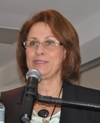
Sílvia Cassiani, Regional Technical Advisor for Nursing and Health of PAHO/WHO reaffirmed the role of articulation that national representations can have on countries with respect to networks. Using as example the nursing networks of the Americas, Sílvia emphasized the need to build national networks of technical education in order to enlarge discussions and actions, strengthening the feeling of belonging and then, hence work on several levels. “If we have 19 countries, we can have 19 networks”, she said. According to her, the problems faced by RETS are the same faced by other networks and, even if we have the goal of improving our performance, we must recognize that RETS reached a maturity that other networks have yet to achieve.
On the issue of emptying the network, it reinforced the need for dissemination of the work and the proposal. "Who is in RETS need to know what a network is and what are the advantages and disadvantages of belonging to the network and get involved with the work done”, she suggested. For her, among the advantages and strengths of networks, it is possible to highlight the possibility of mutual learning among members and the formation of a privileged space for the emergence of new ideas and innovative solutions to existing problems.
Specific meetings discuss regiment and work plans of the sub-networks
The morning of November 8th was reserved for specific discussions of RETS-CPLP and RETS-Unasur. The purpose of each meeting was to discuss the proposals of regulations and work plan for the next two years presented by the Executive Secretariat, as well as electing the institution in charge of network management in this period. All documents approved at the meetings are available on the website of RETS.
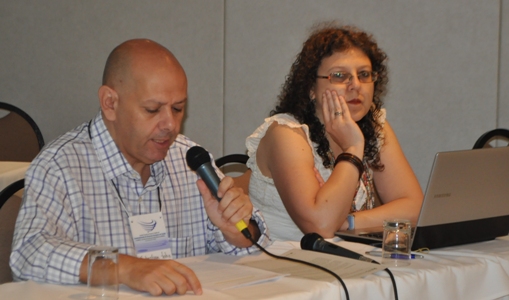 At the meeting of RETS-Unasur, coordinated by the Deputy Director for Research and Technological Development of EPSJV/Fiocruz, a proposal of regulation has been closed and will be sent to the PPT of Unasur-Health for approval. The Work Plan, designed in an integrated manner with the commitment by Unasur during the 3rd Global Forum on Human Resources for Health, was approved almost without exceptions. “The idea was to build a Work Plan more realistic and less ambitious than could be done in full, with the effective participation of all countries, and that serves to generate crucial information for future activities of the Network. In this sense, we proposed the realization, in partnership with Isags, of a study at government level that allows us to draw an overview of the education and work of health technicians in 12 countries in the region, identifying the type of existing education, the legal framework of it, regulated professions and other relevant legal and organizational aspects”, explains Ana Beatriz de Noronha, highlighting the importance of the project: “Today, there is a very different picture of technical education in the countries and a great knowledge of what occurs in each of them. This makes it difficult to implement some cooperation actions that could be fully realized in spite of differences. Furthermore, as the survey will be done within governments, our expectation is that this will strengthen the process of institutionalization of RETS-Unasur in the countries”.
At the meeting of RETS-Unasur, coordinated by the Deputy Director for Research and Technological Development of EPSJV/Fiocruz, a proposal of regulation has been closed and will be sent to the PPT of Unasur-Health for approval. The Work Plan, designed in an integrated manner with the commitment by Unasur during the 3rd Global Forum on Human Resources for Health, was approved almost without exceptions. “The idea was to build a Work Plan more realistic and less ambitious than could be done in full, with the effective participation of all countries, and that serves to generate crucial information for future activities of the Network. In this sense, we proposed the realization, in partnership with Isags, of a study at government level that allows us to draw an overview of the education and work of health technicians in 12 countries in the region, identifying the type of existing education, the legal framework of it, regulated professions and other relevant legal and organizational aspects”, explains Ana Beatriz de Noronha, highlighting the importance of the project: “Today, there is a very different picture of technical education in the countries and a great knowledge of what occurs in each of them. This makes it difficult to implement some cooperation actions that could be fully realized in spite of differences. Furthermore, as the survey will be done within governments, our expectation is that this will strengthen the process of institutionalization of RETS-Unasur in the countries”.
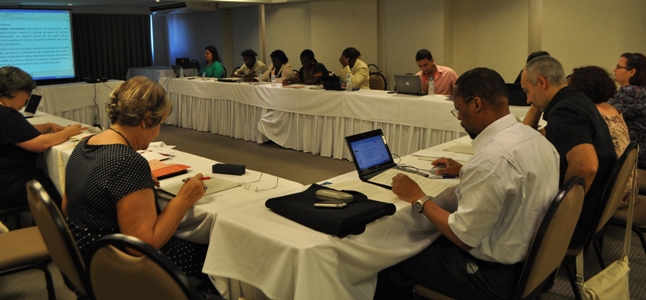
At the meeting of CPLP, coordinated by Grácia Gondim, current coordinator of International Cooperation of EPSJV/Fiocruz, the discussion was restricted to network regulation, leaving the discussion of the Work Plan until the first half of 2014, at a meeting to be held in Portugal. According to the text of the regulation approved at the meeting that will be submitted to the Technical Health Group of CPLP, the four functions of RETS-CPLP are:
1. Monitor and systematize, permanently, the information related to the area of technical education of health workers and its interface with the organization of health work, facilitating the identification of trends and educational needs, in order to support the definition of public policies for the area;
2. Promote technical-scientific and educational cooperation among member institutions for the development of educational proposals, curriculum projects, courses, teaching materials, teaching methods and education in priority areas, seeking alternatives and experiences that can be shared;
3. Develop mechanisms to facilitate the production, dissemination and systematization of information and communication on the field of technical education in health among members of the Network;
4. Foster the development of research among member institutions in the interface of areas of Health, Education and Work, which can widen and strengthen their teaching activities and technical cooperation.
In the case of RETS-CPLP, the technical coordination of the Network is still responsibility of EPSJV/Fiocruz, which was also indicated to remain as manager of the institution RETS-Unasur. “This situation flatters us a lot, because it represents recognition of the work we have developed. However, we also know that it is very important to share the responsibility of management with other members of the Network, even for that in the future, they feel more willing to assume the role”, Ana Beatriz said.
Panel prepares participants for final discussions
The afternoon of November 8th began with the panel ‘Networking: recognizing the potential and overcoming difficulties’, which aim was to anticipate some questions that would be important for the final plenary of RETS. On the panel, coordinated by Grácia Gondim, Human Resources consultant of PAHO/WHO for the Sub-region of Central America and the Dominican Republic, Mónica Padilha, and Marcela Pronko brought their valuable practical experience in networking and network research to share with the people present.
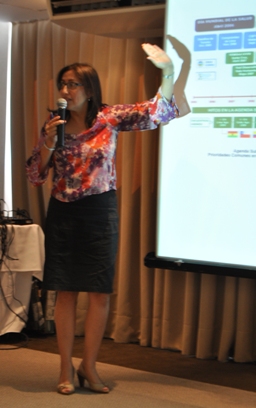 In her presentation, Mónica emphasized learning in networking and made a critical review of the work she has done and still has been doing in the establishment of the Andean Network and Central American Network of Observatories of Human Resources in Health. Highlighting some already established strategies, she reminded the importance of proper use of management and technological resources to strengthen labor, as well as the need for capacity building in this area. “We can cite the integrated information system of the HRH Observatory (http://dev.observatoriorh.org/centro), in which information on the Measurement of Regional Goals of HRH and Virtual Campus of Public Health are available (http://www.campusvirtualsp.org/), which has played an important role in the development of health personnel”, she said. Another good example of capacity building for networking, according to her, would be the practical course: ‘Gestión de Observatorios de Recursos Humanos em Salud para los países de Centroamérica y República Dominicana’, which is available free on the Internet (http://dev.observatoriorh.org/centro/?q=node/75) and adds quite useful material for the development of HRH observatories, as well as management of websites and use of Drupal CMS content manager.
In her presentation, Mónica emphasized learning in networking and made a critical review of the work she has done and still has been doing in the establishment of the Andean Network and Central American Network of Observatories of Human Resources in Health. Highlighting some already established strategies, she reminded the importance of proper use of management and technological resources to strengthen labor, as well as the need for capacity building in this area. “We can cite the integrated information system of the HRH Observatory (http://dev.observatoriorh.org/centro), in which information on the Measurement of Regional Goals of HRH and Virtual Campus of Public Health are available (http://www.campusvirtualsp.org/), which has played an important role in the development of health personnel”, she said. Another good example of capacity building for networking, according to her, would be the practical course: ‘Gestión de Observatorios de Recursos Humanos em Salud para los países de Centroamérica y República Dominicana’, which is available free on the Internet (http://dev.observatoriorh.org/centro/?q=node/75) and adds quite useful material for the development of HRH observatories, as well as management of websites and use of Drupal CMS content manager.
As coordinator of Project Mercosur (see RETS 14), which sought to evaluate quantitatively and qualitatively the provision of technical education of health workers in the Southern Cone countries – Argentina, Brazil, Paraguay and Uruguay –, Marcela presented the methodology used and some results obtained in the study. Her presentation aimed to first clarify some important aspects of the proposed work plan for RETS for the next four years, which main point is to try to extend the ‘Mercosur Research’, to other interested countries, with appropriate adjustments to the specific of each country and with the support of the teams that have participated in the project.
Changes in regulation of RETS are for another time
The final plenary of the Meeting had four objectives: discussion and approval of the Work Plan for the period 2014-2017; revision of the Regulation, election of the Executive Secretariat headquarters and, finally, the joint preparation of a document on the education of health technicians to be taken to the 3rd Global Forum on Human Resources for Health.
“Our proposed Work Plan for the Network followed the same logic of the others. We wanted something that could be implemented and allow us to focus. We were happy because the present document, which was approved with minor modifications, incorporates three goals – (1) to produce, promote and foster the exchange of knowledge in the field of technical education in health; (2) strengthen, broaden and diffuse RETS, and; (3) enhance and expand communication activities within the Network – and only four actions, among which, the realization, with support from PAHO/WHO, in a multicenter study in countries that meet our invitation and who undertake to work in accordance with the methodology already applied by Mercosur countries”, commented Ana Beatriz.
The election of the Executive Secretariat headquarters also occurred without major problems. As there was no presentation of any application, it was decided that EPSJV/Fiocruz remains in this role for four more years.
The lack of time has led the plenary to opt for discussion on the Document of Recife, considered more politic, leaving the modifications of the Regulation for a later time. The document, approved after much debate and negotiations, calls attention of the world's authorities for the lack of visibility of the technical work and worker in health and asks the subject to be placed more frequently in the discussion about health workforce.
After two days of intense and invigorating work, the director of EPSJV/Fiocruz, Paulo Cesar Ribeiro, closed the meeting with thanks and promises. “I´m thrilled to be here. This is a space full of energy, while I appreciate the confidence placed in the School, I also commit myself to work even harder, together with all the staff that is directly involved with the issues of the Network, to strengthen this initiative that represents a lone voice in defense of these workers who, despite their strategic importance to health systems, are constantly forgotten by the authorities of the sector”, he said.
With the word, some members of the Network
To João Lobato, president of the School of Health Technology of Lisbon (ESTeSL), the meeting was a time of consolidation of RETS as thematic network of international interest for the education of health professionals. He also considers relevant the fact that the panels have contributed to a gain of awareness about the nature and concept of network as well as to expand the sense of belonging and full integration of partners.
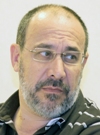 “In the specific case of the meeting of RETS-CPLP, I highlight the possibility of rediscovering partners we have worked with over the last few years, in side projects and the discussion and approval of the Regulation which enabled the enhancement of understanding of the position and the importance of partners in RETS, in addition to promoting a fruitful discussion on the status of the partner network of RETS, on basis of understanding of free and universal membership”, he adds. “For the next meetings, I think that apart from one or two general thematic panels on the nature, importance and role of networks, it is also interesting opening up space for the involvement of partners in order to raise awareness of the realities and experiences in the countries. This would serve to increase mutual understanding among partners of the network and exchange experiences. It could also be interesting to promote spaces with prior registration of the partners to present free communications, thus opening the Meeting of RETS for integration of a political, scientific, educational and technical perspective”, João suggests, reminding that we could think of a few workshops or spaces aimed for teachers, others for leaders and other times for student meetings of various institutions and realities portrayed by RETS, enabled through the free registration and paid by participants/partners themselves. “Finally, I leave my best wishes to keep doing a good work and a strong appreciation for the effort and dedication of the Executive Secretariat of RETS. Congratulations! Greetings to all on this side of the Atlantic”, he concludes.
“In the specific case of the meeting of RETS-CPLP, I highlight the possibility of rediscovering partners we have worked with over the last few years, in side projects and the discussion and approval of the Regulation which enabled the enhancement of understanding of the position and the importance of partners in RETS, in addition to promoting a fruitful discussion on the status of the partner network of RETS, on basis of understanding of free and universal membership”, he adds. “For the next meetings, I think that apart from one or two general thematic panels on the nature, importance and role of networks, it is also interesting opening up space for the involvement of partners in order to raise awareness of the realities and experiences in the countries. This would serve to increase mutual understanding among partners of the network and exchange experiences. It could also be interesting to promote spaces with prior registration of the partners to present free communications, thus opening the Meeting of RETS for integration of a political, scientific, educational and technical perspective”, João suggests, reminding that we could think of a few workshops or spaces aimed for teachers, others for leaders and other times for student meetings of various institutions and realities portrayed by RETS, enabled through the free registration and paid by participants/partners themselves. “Finally, I leave my best wishes to keep doing a good work and a strong appreciation for the effort and dedication of the Executive Secretariat of RETS. Congratulations! Greetings to all on this side of the Atlantic”, he concludes.
Also from Portugal, are the pleasant words of Deolinda Cruz, who participated in the Meeting representing the Institute of Tropical Medicine and Hygiene (IHMT), a traditional partner of RETS.
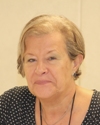 She said the RETS-CPLP is a privileged space, a “gathering of friends” that the same language approaches and is an important Forum for exchange of views and personal enrichment, because it allows to extend knowledge and understanding of the difficulties and the Herculean efforts and not always recognized the leaders of Schools with such different problems, coming from countries where often only the language is common, because the realities differ starkly. “The speech is alive and spontaneous, with lively discussion and the consensus is reached, though sometimes with difficulty. I believe that the effort of the Executive Secretariat in the future lies in trying to maintain a line of continuity of the participants, and they, abandoning a vision of individual participation, start to effectively represent their country and their school”, she says, adding: “I think we will get, but it will take time”.
She said the RETS-CPLP is a privileged space, a “gathering of friends” that the same language approaches and is an important Forum for exchange of views and personal enrichment, because it allows to extend knowledge and understanding of the difficulties and the Herculean efforts and not always recognized the leaders of Schools with such different problems, coming from countries where often only the language is common, because the realities differ starkly. “The speech is alive and spontaneous, with lively discussion and the consensus is reached, though sometimes with difficulty. I believe that the effort of the Executive Secretariat in the future lies in trying to maintain a line of continuity of the participants, and they, abandoning a vision of individual participation, start to effectively represent their country and their school”, she says, adding: “I think we will get, but it will take time”.
“RETS-Unasur was a new experience for me, but very nice because it allowed me to know a different reality, combined with a culture unknown to me. Consensus will be harder because of the existing differences, but it is undoubtedly a privileged place to share experiences that can complement and enrich both parties”, she says. “I highlight again the work of the Executive Secretariat in getting together ‘two worlds’, so professional with high technical competence, but also an extraordinarily friendly atmosphere where everyone is involved and which I am aware, will bear fruit in the future”, she adds.
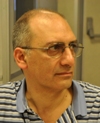 In the opinion of Charles Einisman, president of the Argentine Association of Nuclear Medicine Technicians (AATMN), the Meeting of RETS meant a new opportunity to rediscover and deepen the bonds among members, know the different situations and be able to build a broader vision and enriching the regional reality. “We see with pleasure the steps in this space and recognition of the place that workers and health professionals take, even with the significant differences that persist in diverse local realities. The Network is an excellent political and intellectual scene for interaction among members and the best strategy to strengthen the joint work”, he argues, suggesting that it is time to generate, within RETS, research on the invisibility of health technicians and to think together a strategy to reverse it. “We, from the societies of health technicians shall participate more in RETS, since education is a determinant of the quality and scope of professional practice”, he concludes.
In the opinion of Charles Einisman, president of the Argentine Association of Nuclear Medicine Technicians (AATMN), the Meeting of RETS meant a new opportunity to rediscover and deepen the bonds among members, know the different situations and be able to build a broader vision and enriching the regional reality. “We see with pleasure the steps in this space and recognition of the place that workers and health professionals take, even with the significant differences that persist in diverse local realities. The Network is an excellent political and intellectual scene for interaction among members and the best strategy to strengthen the joint work”, he argues, suggesting that it is time to generate, within RETS, research on the invisibility of health technicians and to think together a strategy to reverse it. “We, from the societies of health technicians shall participate more in RETS, since education is a determinant of the quality and scope of professional practice”, he concludes.

